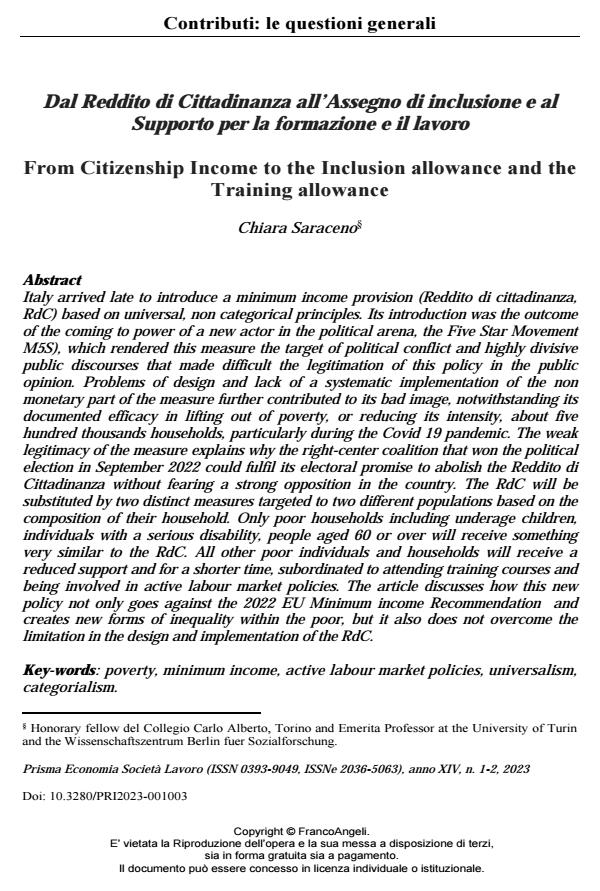From Citizenship Income to the Inclusion allowance and the Training allowance
Journal title PRISMA Economia - Società - Lavoro
Author/s Chiara Saraceno
Publishing Year 2024 Issue 2023/1-2
Language Italian Pages 15 P. 32-46 File size 322 KB
DOI 10.3280/PRI2023-001003
DOI is like a bar code for intellectual property: to have more infomation
click here
Below, you can see the article first page
If you want to buy this article in PDF format, you can do it, following the instructions to buy download credits

FrancoAngeli is member of Publishers International Linking Association, Inc (PILA), a not-for-profit association which run the CrossRef service enabling links to and from online scholarly content.
Italy arrived late to introduce a minimum income provision (Reddito di cittadinanza, RdC) based on universal, non categorical principles. Its introduction was the outcome of the coming to power of a new actor in the political arena, the Five Star Movement M5S), which rendered this measure the target of political conflict and highly divisive public discourses that made difficult the legitimation of this policy in the public opinion. Problems of design and lack of a systematic implementation of the non monetary part of the measure further contributed to its bad image, notwithstanding its documented efficacy in lifting out of poverty, or reducing its intensity, about five hundred thousands households, particularly during the Covid 19 pandemic. The weak legitimacy of the measure explains why the right-center coalition that won the political election in September 2022 could fulfil its electoral promise to abolish the Reddito di Cittadinanza without fearing a strong opposition in the country. The RdC will be substituted by two distinct measures targeted to two different populations based on the composition of their household. Only poor households including underage children, individuals with a serious disability, people aged 60 or over will receive something very similar to the RdC. All other poor individuals and households will receive a reduced support and for a shorter time, subordinated to attending training courses and being involved in active labour market policies. The article discusses how this new policy not only goes against the 2022 EU Minimum income Recommendation and creates new forms of inequality within the poor, but it also does not overcome the limitation in the design and implementation of the RdC.
Keywords: poverty, minimum income, active labour market policies, universalism, categorialism.
Chiara Saraceno, Dal Reddito di Cittadinanza all’Assegno di inclusione e al Supporto per la formazione e il lavoro in "PRISMA Economia - Società - Lavoro" 1-2/2023, pp 32-46, DOI: 10.3280/PRI2023-001003